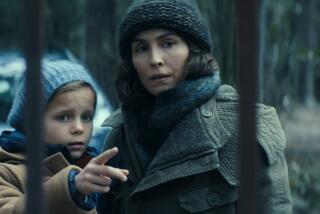‘October Sky’ Unabashedly Reaches for the Stars
- Share via
“October Sky” is one of the most unfashionable movies of the new year, and one of the more appealing. Made with a gee-whiz earnestness and simplicity that’s so out of style it’s rather refreshing, this reality-based tale of a West Virginia teenager’s hopes and dreams is not only a stranger to cynicism, it also manages to be unapologetically sentimental without the excessive emotional pandering that’s become so much the rule with films of this type.
The story “October Sky” tells is the one Homer H. Hickam Jr. related in his well-reviewed 1998 memoir, “Rocket Boys,” a finalist for the National Book Critics Circle Award. It tells of a young man growing up in the 1950s with a passion for exploring outer space in a town, Coalwood, W. Va., that sent every healthy male in exactly the opposite direction, down deep below the surface into labyrinthine pits to mine for coal.
Having spent much of his career as an Oscar-winning creator of visual effects--a helpful background for the director of “Honey, I Shrunk the Kids” and “Jumanji”--Joe Johnston may seem an unlikely choice for this kind of film. But Johnston also directed the similarly innocent “The Rocketeer,” and working with screenwriter Lewis Colick, he has turned out a film so gosh darn old-fashioned it might have emerged from a time capsule.
With Chris Cooper and Laura Dern as its best-known acting names, “October Sky” banks on the impact little-known faces can have and, with the help of casting director Nancy Foy, that faith has paid off. Jake Gyllenhaal is appropriately Huck Finn-ish as Homer, and William Lee Scott, Chris Owen and Chad Lindberg play his three pals and fellow rocket boys (cut down from the book’s grand total of six) with the requisite spunk and enthusiasm.
So soft at times it uses the classic ‘50s rock on its soundtrack for edge, “October Sky” is especially well served by Cooper, whose feature roles include a key part in John Sayles’ “Lone Star.” An intense, focused actor, Cooper plays Homer’s father, John, the mine superintendent in tiny Coalwood, and his portrait of a caring but rigid and unbending figure gives the film a kind of backbone it wouldn’t otherwise possess.
Lovingly re-created in Tennessee (with a nod to the visual look of celebrated West Virginia photographer O. Winston Link, who has a tiny cameo as a train engineer), Coalwood was a town that wouldn’t exist without the inky-black fuel that gave it its name.
The news that the Russians have put a Sputnik into orbit around the Earth is unnerving enough to shake up people in 1957, even here. Young Homer joins his fellow townspeople watching the October skies for the satellite’s appearance, and the sight of it has a lasting effect. “I’m thinking of building a rocket,” he tells his parents (Cooper and Natalie Canerday) and his brother Jim (Scott Miles) at breakfast the next morning, shocking them as much as if he’d announced he was about to move to the Soviet Union.
Homer, however, is hard to discourage; as the local football coach tells him when he tries out for the team in the film’s opening sequence, “You sure got guts, but you got to know when to quit.” Working first with best pals Roy Lee (Scott) and O’Dell (Lindberg), he sets out to build rockets with whatever homemade parts and assistance he can muster, even writing to NASA scientist Wernher Von Braun when he feels especially put upon.
It’s a mark of Homer’s determination to succeed that he risks committing social suicide by enlisting the aid of glasses-wearing classmate Quentin (Owen), the school’s nerdy science and math whiz. An even bigger help is science teacher Miss Riley (a small, restrained but remarkably effective performance by Dern), who encourages him to work hard enough to enter the local science fair. “You can’t,” she says, “just dream your way out of Coalwood.”
There are barriers to the rocket boys’ quest, but because “October Sky” is based on reality, some of them turn out to be unexpected. Homer’s most durable obstacle is, however, not surprising: a hard-headed, no-nonsense dad who refuses point-blank to understand what his son’s passion is all about.
A father who can’t connect across the generations couldn’t be more of a stock figure, as are many others in Colick’s screenplay. But “October Sky’s” evident sincerity, its air of decency as it explores the power of a dream, help make these people more substantial than might be expected.
“October Sky” has another anachronistic characteristic--and that is its vision of an America we’d like to believe in, an America where hard work and determination can make something happen, an America we see in the home movie glimpses of the real Homer and his friends that end the film. It’s a country we want to feel existed once upon a time, a country we’d like to live in even now.
* MPAA rating: PG, for language, brief teen sensuality and alcohol use, and for thematic elements. Times guidelines: an intense father-son conflict.
‘October Sky’
Jake Gyllenhaal: Homer Hickam
Chris Cooper: John Hickam
William Lee Scott: Roy Lee
Chris Owen: Quentin
Chad Lindberg: O’Dell
Natalie Canerday: Elsie Hickam
Laura Dern: Miss Riley
A Charles Gordon production, released by Universal Pictures. Director Joe Johnston. Producers Charles Gordon, Larry Franco. Executive producers Marc Sternberg, Peter Cramer. Screenplay Lewis Colick, based on the book “Rocket Boys” by Homer H. Hickam Jr. Cinematographer Fred Murphy. Editor Robert Dalva. Costumes Betsy Cox. Music Mark Isham. Production design Barry Robison. Art director Tony Fanning. Set decorator Chris Spellman. Running time: 1 hour, 48 minutes.
In general release throughout Southern California.
More to Read
Sign up for our Book Club newsletter
Get the latest news, events and more from the Los Angeles Times Book Club, and help us get L.A. reading and talking.
You may occasionally receive promotional content from the Los Angeles Times.









